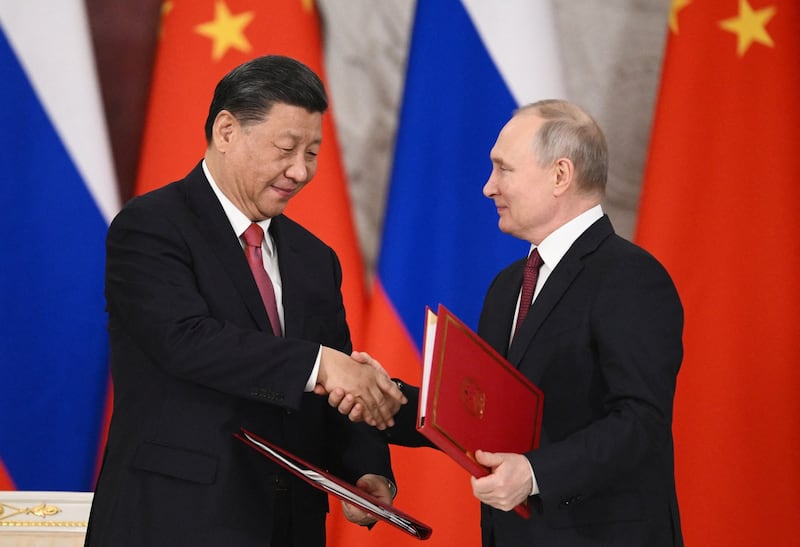Chinese Foreign Minister Wang Yi on Monday began a four-day trip to Russia during which both sides could shore up their strategic ties, a day after Beijing’s ally and North Korean leader Kim Jong Un concluded a six-day visit to Russia’s Far East.
Wang will be in Russia for the China-Russia strategic security consultation, the Chinese Foreign Ministry said in a statement Monday.
The top diplomat's trip to Russia follows on the heels of Kim's high-profile visit to Russia where he and Russian President Vladimir Putin vowed to step up cooperation on multiple fronts – from the economy, diplomacy to the military. The Kim-Putin summit came as China did not actively respond to Moscow's call in July to conduct a trilateral joint military drill to form a united front against the United States and its allies.
“China’s perspective on the strengthening ties between Russia and North Korea is rather multifaceted,” said Ji Seong-ho, a North Korean defector-turned-South Korean lawmaker.
“Beijing must carefully assess how such a development impacts its influence over both North Korea and Russia, as it faces competition with the U.S.,” Ji said.
“China has recently been at the receiving end when it comes to calls for diplomatic collaboration from Russia and North Korea. But its domestic challenges, particularly its economic concerns, have inevitably limited its maneuverability,” Ji added.
“It seems China is attempting to assert its role in the region before it’s too late.”
Wang’s visit could underscore Beijing’s attempt to reiterate its strategic significance to its longtime neighboring allies, Moscow and Pyongyang, ensuring its influence remains paramount for both nations. In fact, China’s economic and security interests are largely related to those of its two neighbors.
Yet, China could be stuck between a rock and a hard place. It neither wants to be too close to North Korea and Russia, which are under U.N. sanctions regimes, nor too distant as that could translate into its diminished regional clout that weakens its leverage against the U.S. and its allies.
Conversely, closer ties between Pyongyang and Moscow may also result in both countries being less dependent on China. North Korea’s nuclear provocations have already pushed China’s neighbors South Korea and Japan to draw closer to Washington.
“China would most likely feel the strain in its relationship with North Korea right now,” said Park Won-gon, an associate professor in the department of North Korean studies at Ewha Womans University. “While it doesn’t want to see North Korea going nuclear, it also doesn’t want to see its influence diminishing. It would be a difficult problem for China.”
The Kim-Putin summit on Wednesday has triggered the U.S. and its allies, South Korea and Japan, to ratchet up countermeasures. The two leaders vowed to intensify security cooperation that could change regional security dynamics, which could eat into Beijing's interests.
China has long opposed the emergence of a multilateral security platform in the region, in what it described as a “mini-Nato” in the Indo-Pacific. The allies’ collective military prowess is not only seen to surpass that of China, Russia and North Korea put together, it may also deter Beijing’s expansionist ambitions in the region, including territorial claims in the South China Sea.
Taiwan’s defense ministry said on Monday that since Sunday, it has spotted 103 Chinese People’s Liberation Army aircraft crossing the median line of the Taiwan Strait – an unofficial barrier between the two sides – that China began crossing in the last few years.
China-Russia relations
Wang’s visit, therefore, may provide an opportunity for Beijing to engage in the regional security matters, whilst potentially gaining an insight into the outcome of any agreements between Kim and Putin.
But Ewha Womans University’s Park is doubtful if Beijing could get additional details. “It is less likely that both sides would release anything on the recent development of the North Korea-Russia relations,” he said.

Chinese President Xi Jinping and Putin called each other “dear friends” during Xi’s state visit to Moscow in March, where he pledged solidarity with Russia, “to stand guard over the world order based on international law.”
China has helped safeguard Russia from isolation by the Western democracies after the invasion of Ukraine, by increasing imports of Russian oil, and selling more electronic and computer equipment to the country.
The Chinese diplomat’s visit is also seen as readying the ground for Putin’s potential trip to Beijing next month for the Belt and Road forum, a platform that showcases the Chinese massive infrastructure-led strategy to seek global dominance.
Russia’s Foreign Ministry said last week that Wang will meet his Russian counterpart Sergey Lavrov for talks that will cover Ukraine and security in the Asia Pacific region, according to a Monday report by the official news agency, Tass.
On Sunday, Wang met U.S. National Security Advisor Jake Sullivan in Malta for “candid substantive, and constructive discussions,” both the White House and the Chinese Foreign Ministry said in statements.
While the two sides are committed “to pursue additional high-level engagement and consultations in key areas” in the coming months, Wang, according to the Chinese Foreign Ministry statement, stressed that the Taiwan issue is the first red line that must not be crossed in U.S.-China relations.
Edited by Taejun Kang and Mike Firn.
